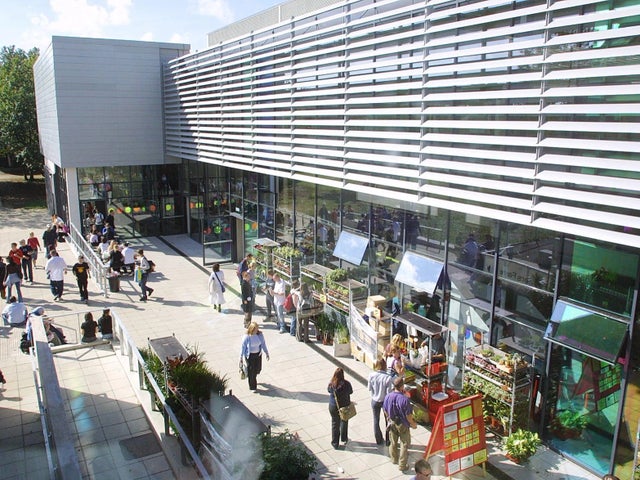Your Union menu
Build Confidence
The Students’ Union is an independent charity that exists to advance your education at the University of Portsmouth through a range of exciting services and activities. Our mission is to have a positive impact with every Portsmouth student: Students are heard, students are empowered, students thrive.
Elections menu
information
The Students’ Union Elections.
Get Advice menu
Get Advice
Campaigns and Info
At UPSU's Advice Service, we offer confidential, impartial and non-judgemental support on a range of academic and university issues that may affect your experience. Our team of trained advisers are on hand all year round to offer help where it's needed. The independent service works closely with the University of Portsmouth to resolve issues and ensure students are treated fairly.
Representation menu
UPSU are here to represent every student at the University of Portsmouth. We have many ways you can express your student voice, including: our Course Rep system, Have Your Say, Student Council, StART, Hot Topic, Annual Survey, Focus Groups, and more! Click on the tabs to learn more about each platform regarding Representation! You can also see a summary of our research by clicking on the UPSU Research & Data page.
Student Groups menu
Contact Us
Student Groups are a great development opportunity and a great place to find new friends, build a community and have a sense of belonging whilst at University!

Skills you need
The skills you need!
In this section, we will be doing lots of research on the skills that employers tell us that graduates need the most - and putting that research here so that when you think about your future, you'll have the power to make sure that you stand out from the crowd.
What skills are employers looking for?
We've undertaken a massive amount of research to try and identify what skills employers want to have in their new hires. By analysing organisations such as the World Economic Forum, Career Wave and Forbes, we've decided on a list of 10 key skills you need to succeed when you graduate.
- Analytical thinking and innovation - breaking down complex problems into smaller parts and approaching it step by step. Quickly solving problems and being able to come up with new ideas and innovate.
- Active learning and learning strategies - to be successful in the future and be able to use and manage advancing technologies, we are going to have to engage in life-long learning.
- Creativity, originality and initiative- creative people are becoming increasingly sought after. However, creativity is not just about being good at art, it is also about how you think. For example, you can be a creative thinker, but not be a great painter or graphic designer. Instead you might be someone who sees things differently, can suggest new, original ways of doing things and pushes their ideas forward (i.e. using your initiative). You are able to learn more on how to think creatively using this link.
- Technology design and programming - this skill is most relevant for specific jobs e.g. those within the fast growing I.T. and Digital sector. However, knowing that this sector is one of the fastest growing areas of work in the world, might encourage you to take up an I.T. related qualification or training (it is never too late to do this and you do not need to have studied an I.T. qualification at school to do so in the future). You can learn how to program using different languages using this link.
- Critical thinking and analysis - to think critically, we need to be observant (see what is going on), be able to interpret things (understand what is being meant), be reflective (take a step back and think things through), be able to evaluate (weigh up evidence), be analytical (break things down) and be able to explain yourself. If we are able to think critically we can make better decisions. If you want to further your learning you can do a critical thinking course using this link.
- Complex problem-solving - complex problems are those that are often hard to define or they are just too big to solve on our own. For example, how do we solve a worldwide problem like coronavirus or global warming. People who are complex problem solvers come up with ideas, are very knowledgeable and, crucially, can collaborate and work with others to share these ideas and knowledge, ultimately coming up with solutions. If you want to further your learning you can do a complex problem-solving course using this link.
- Leadership and social influence - are you a leader? Have you directed and guided willing people to a particular decision or outcome? Leaders take people with them, not bully or force others to do things against their will. In terms of social influence, this skill is about accomplishing something for the greater good- the good of a team, a school, a community, a neighbourhood, a country or even the world. If you want to further your learning in leadership use this link to find various specific leadership courses available.
- Emotional Intelligence (EI) – people who have high EI are able to display empathy for others, know what to say and when to say it, can deal with difficult situations and appreciate the opinions of others. Emotionally Intelligent people are also better placed to manage their own emotions, health and well-being in work and in life generally. They are also more resilient, a very important quality in these uncertain times. If you want to further your learning you can do an emotional intelligence at work course using this link.
- Reasoning, problem-solving and ideation - is to think about something in a logical way to come up with a conclusion or an answer. For example, what is your reasoning for choosing those A-levels? Good reasoning allows us to solve everyday problems and more complicated ones. The process of reasoning can lead to ideas about how to solve a particular problem e.g. what are the best A-levels to study for a degree in Engineering? Or, what are the alternative pathways to Engineering, because I don’t want to study A-levels. If you want to further your learning you can do a complex problem-solving course using this link.
- Systems analysis and evaluation - is a problem-solving technique that ensures that a specific system works and, if it doesn’t work, how the system can be improved. Remember analysis involves the breaking down of big things into parts. So in systems analysis it is about breaking down a whole system into its components and analysing and evaluating the performance of each individual part.
Links to our research
If you want to check our research yourself, here's some links to some of our research. (These files link out to different PDF's with some of our raw research).
Page created: Wed, 02 Nov 2022 17:36:32 GMT
Page updated: Tue, 14 Feb 2023 15:30:01 GMT
Contact Us
-
Call: 023 9284 3628
-
Email: hello@upsu.net
-
-
Useful Links
Social Accounts

The University of Portsmouth Students’ Union has a vision of creating a positive impact with every Portsmouth student during their time at University.



